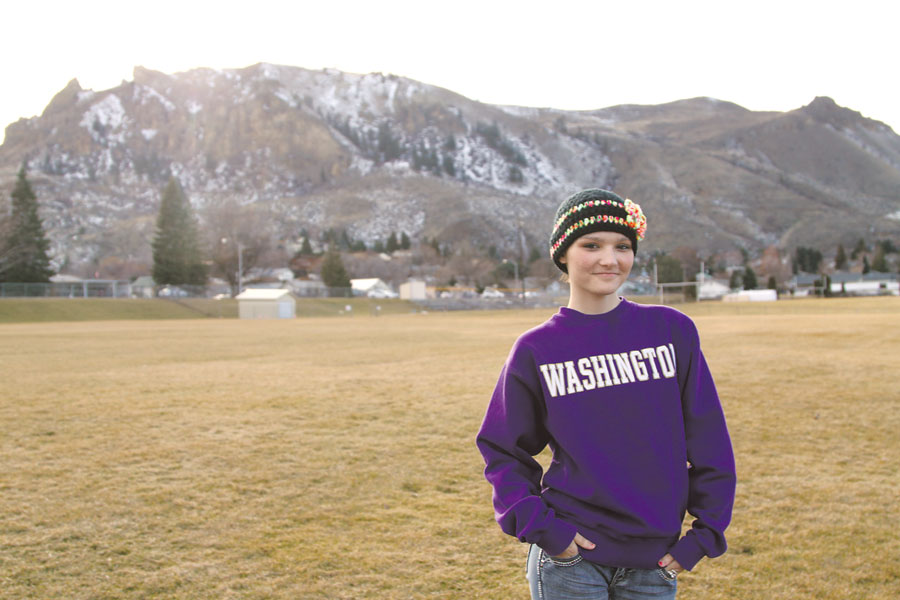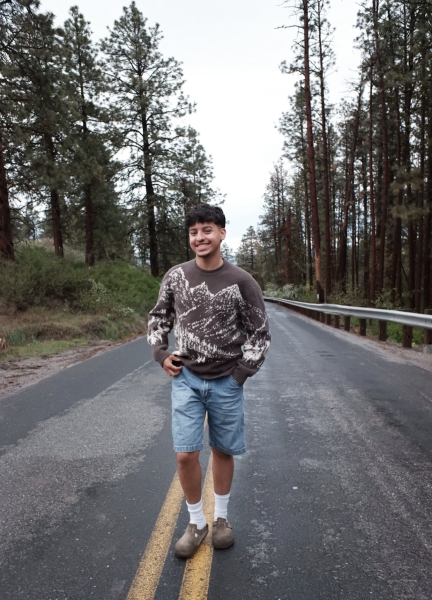Winning the battle
Freshman Serena Prunty used optimism and support to get through her struggle with ovarian cancer
Freshman Serena Prunty
With a thin, frail frame towering only a little over five feet, from the outside Serena Prunty is a mere 14-year-old freshman at Wenatchee High School.
But the moment you talk to her, you recognize the strength that’s within. Speaking confidently and calmly, Prunty is not overwhelmed by emotions or exudes self-pity. She barely bats an eye when describing injecting a needle in the port inside her body to administer chemotherapy. She admits she cried when losing a clump of hair for the first time but quickly points to the positive by saying at least she doesn’t have to shave. And in less than five days after learning her cancer was gone, Prunty was back in school, because it seems like nothing, not even her battle with ovarian cancer, phases this girl.
While two days before Thanksgiving found most students ready for break, for Prunty it marked her cancer diagnosis that explained a couple months of severe stomach aches.
“The first pain, it started in like October, and then we went in and checked, and they said they weren’t sure what it was, so they weren’t going to give me medicine for it,” Prunty said. “So then we just let it be, and within that month the tumor grew to 17 centimeters. And that’s when the doctor had found the lump, and I had started going through tests to see what it was.”
Prunty was sent to Seattle Children’s Hospital, where a MRI indicated she had a tumor in her stomach. An emergency surgery removed it, though parts of the tumor fell back into her body during the procedure.
“When they tested the tumor it came out cancerous, so they knew that the stuff that went back inside of her, they had to get rid of. And that’s why she started chemo,” Nikki Prunty, Serena’s mother, said.
Like anyone, Serena and her family were shocked by the diagnosis but even more so due to her young age and an ambiguous cause.
“Once we found out it wasn’t just a stomach ache, it was kind of shocking to me because I didn’t really think something like this, [cancer], could be like a stomach ache,” Serena said. “That was our big question, [what caused it], and they said there was no real cause to it.”
“Anywhere between 40- to 60 year-olds have ovarian cancer, so she’s a very rare case,” Nikki said. “And it has nothing to do with genes, genetic wise, and it has nothing to do with environment. It just happened.”
Since her diagnosis, Serena received three treatments of chemotherapy, spending five days in Seattle for each of them and three weeks in between at home.
“[Chemotherapy] tires you out a lot. The week I came back from my first treatment, I was sleeping most of the time,” Serena said. “It’s also hard because… on top of [chemotherapy] you’re getting meds, and the chemo and medicine interlock… and messes my body system up completely.”
From losing hair, weight, and immune system strength, treatment added precautions to everyday life, especially when her blood cell counts were down, and she was required to stay home to avoid infection or sickness.
“[The hardest part is] seeing her have to sit at home and not be with her friends or go to the mall or the movies and all that stuff because she can’t be with crowds of people,” Nikki said. “She’s a teenager, and she needs to have a teenage life and do what teenagers do, and she hasn’t been able to do it.”
But even this obstacle couldn’t seem to bring Serena down. “I don’t think of the negatives of [treatment]. I think of the positive things, like it’s helping me and that’s all that matters,” Serena said.
One Feb. 26, a CT scan proved her thinking right. Since that day, Serena has been cancer free.
“We were very, very, very happy about the whole thing,” Nikki said. “There is no specific words to describe it.”
“It doesn’t feel any different,” Serena said. “It’s a relief that it is all gone, but it’s just like normal life.”
The following Monday, Serena returned to school with plans to take it easy and ease back into a regular routine. During treatment, she completed work sent to her from three classes and most likely will take those for the remainder of the year.
“The easiest way to learn is through the school system, but your health matters the most,” Dean of Students, and relative, Mike Franza said. “You can always learn.”
In two weeks, Serena will return to Seattle to have her port removed. Though both her parents have worked full time during this whole experience, travel and medical expenses have added up.
Recognizing their need, the community has responded. Since its launch on Jan. 9, “Serena’s Fund” on gofundme.com has received around 1,300 shares and over 100 people have donated more than $6,000, surpassing the original goal and upping it to $10,000.
“So, I would say half the people on there are complete strangers,” Nikki said. “It’s an overwhelming thing but a good overwhelming thing because there are so many people out there who care about her.”
In Serena’s eyes, the community’s support symbolizes the positive in the situation. “It made me look at [the situation] like it’s kind of a good thing,” Serena said. “[Having cancer] has shown how much confidence I have in myself.”





